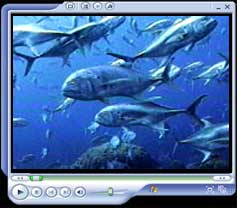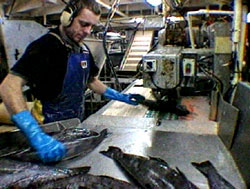No fish by 2050
Research announced this week shows that, if present fishing practices are allowed to continue, there will be no viable ocean fishing in just another 40 to 50 years.
Fishing Records
The researchers studied fishing records worldwide and found that there's been a major decrease in the number of the ocean's fish and that the decrease is accelerating. According to the report's lead author, Boris Worm of Dalhousie University in Halifax, Nova Scotia, Canada, "When I saw it, I was chilled, I was really shocked because, I didn't expect it to be so soon."
 Worm is blunt with his assessment, saying, "We see very clearly the end of the line. It shows that we're going to run out of viable fisheries, out of all seafood species by the year 2050; so within our lifetimes, certainly within the lifetimes of our children."
Worm is blunt with his assessment, saying, "We see very clearly the end of the line. It shows that we're going to run out of viable fisheries, out of all seafood species by the year 2050; so within our lifetimes, certainly within the lifetimes of our children."
Worm says the problem is commercial fishermen are overfishing the world's oceans, and doing so in a way that is harming the ocean's ecological balance. He points out that fishermen accidentally catch and kill large numbers of commercially undesirable sea life, what fishermen call bycatch. Even though humans don't eat these, fish do. Worm adds other fishing practices, including dragging large nets along the bottom of the ocean floor, can damage the ocean's environment, especially fragile coral reefs.
He says the study shows, "That this is threatening the productivity and stability of ocean ecosystems over time." He says that, in turn, means the numbers of fish caught will vary more and the remaining fish will have less ability to survive further stresses such as warmer oceans or pollution.
To reach this conclusion, a group of scientists from the United States, Canada, Great Britain and Sweden worked for four years pouring over 50 years worth of fishing records. In some cases they went much further back. Worm explains, "We've looked at a thousand year time period of 12 coastal regions worldwide, seeing how species were lost from those regions and what the consequences were." They also examined small controlled studies where researchers removed species of fish and watched what happened.
 "What really surprised me and all of my co-authors," says Worm, "was that the answer we got from the variety of sites was always precisely the same." Without the missing species, says Worm, "we were losing the productivity and the temporal stability of the ecosystem, meaning that it was delivering less goods and services over time…and this delivery was less reliable, more variable over time."
"What really surprised me and all of my co-authors," says Worm, "was that the answer we got from the variety of sites was always precisely the same." Without the missing species, says Worm, "we were losing the productivity and the temporal stability of the ecosystem, meaning that it was delivering less goods and services over time…and this delivery was less reliable, more variable over time."
According to Worm, "We showed that we're about one-third down the trend. There's two-third to go, but since it's an accelerating trend, we only have another 40 or 50 years now."
Not all marine biologists agree that the decline will have such a strong impact on the amount of seafood available for people to eat. Among them is Ray Hilborn of the University of Washington. He says his studies show overfishing can depress fish stocks to just 20 to 40 percent of prior levels and still be very productive, losing only about 15 percent of the potential yield. He says, "Now, to me that's not a crisis. I defy you to find many things in life where you get 85 percent of maximum."
Hilborn agrees that there are many areas in the world that are in trouble because of overfishing, but he says the problem is sometimes overstated. He points to the ban on fishing some species of fish along the west coast of the United States. He explains, "There are six stocks that are overfished, and they collectively add up to 1.5 percent of the total potential biomas of the west coast of the United States. In other words, they're a trivial portion of the food producing capacity of the west coast, and we're effectively losing nothing on the west coast by overfishing."
Worm says the study also offers some hope. In an additional study, the researchers combed the records of marine reserves and places where fishing of some species has been banned. He said those areas quickly started recovering. He says this shows, "If … areas are sufficiently protected, we'll see recovery of ocean species and with it, the stability and productivity of the ocean ecosystem."
Worm is not advocating a ban on fishing, instead he says, "We have to get more intelligent about what we take out of the ocean and what we put into the ocean. … If we do this right, we can continue fishing as we were for hundreds of years, (but) if we continue with the destructive practices we've been employing, we will only have a few decades left."
Greener News Room
Keywords:: COMERCIAL FISHING, ECOSYSTEMS, RESEARCH, SEAFOOD, OCEAN
Fishing Records
The researchers studied fishing records worldwide and found that there's been a major decrease in the number of the ocean's fish and that the decrease is accelerating. According to the report's lead author, Boris Worm of Dalhousie University in Halifax, Nova Scotia, Canada, "When I saw it, I was chilled, I was really shocked because, I didn't expect it to be so soon."
 Worm is blunt with his assessment, saying, "We see very clearly the end of the line. It shows that we're going to run out of viable fisheries, out of all seafood species by the year 2050; so within our lifetimes, certainly within the lifetimes of our children."
Worm is blunt with his assessment, saying, "We see very clearly the end of the line. It shows that we're going to run out of viable fisheries, out of all seafood species by the year 2050; so within our lifetimes, certainly within the lifetimes of our children."Worm says the problem is commercial fishermen are overfishing the world's oceans, and doing so in a way that is harming the ocean's ecological balance. He points out that fishermen accidentally catch and kill large numbers of commercially undesirable sea life, what fishermen call bycatch. Even though humans don't eat these, fish do. Worm adds other fishing practices, including dragging large nets along the bottom of the ocean floor, can damage the ocean's environment, especially fragile coral reefs.
He says the study shows, "That this is threatening the productivity and stability of ocean ecosystems over time." He says that, in turn, means the numbers of fish caught will vary more and the remaining fish will have less ability to survive further stresses such as warmer oceans or pollution.
To reach this conclusion, a group of scientists from the United States, Canada, Great Britain and Sweden worked for four years pouring over 50 years worth of fishing records. In some cases they went much further back. Worm explains, "We've looked at a thousand year time period of 12 coastal regions worldwide, seeing how species were lost from those regions and what the consequences were." They also examined small controlled studies where researchers removed species of fish and watched what happened.
 "What really surprised me and all of my co-authors," says Worm, "was that the answer we got from the variety of sites was always precisely the same." Without the missing species, says Worm, "we were losing the productivity and the temporal stability of the ecosystem, meaning that it was delivering less goods and services over time…and this delivery was less reliable, more variable over time."
"What really surprised me and all of my co-authors," says Worm, "was that the answer we got from the variety of sites was always precisely the same." Without the missing species, says Worm, "we were losing the productivity and the temporal stability of the ecosystem, meaning that it was delivering less goods and services over time…and this delivery was less reliable, more variable over time."According to Worm, "We showed that we're about one-third down the trend. There's two-third to go, but since it's an accelerating trend, we only have another 40 or 50 years now."
Not all marine biologists agree that the decline will have such a strong impact on the amount of seafood available for people to eat. Among them is Ray Hilborn of the University of Washington. He says his studies show overfishing can depress fish stocks to just 20 to 40 percent of prior levels and still be very productive, losing only about 15 percent of the potential yield. He says, "Now, to me that's not a crisis. I defy you to find many things in life where you get 85 percent of maximum."
Hilborn agrees that there are many areas in the world that are in trouble because of overfishing, but he says the problem is sometimes overstated. He points to the ban on fishing some species of fish along the west coast of the United States. He explains, "There are six stocks that are overfished, and they collectively add up to 1.5 percent of the total potential biomas of the west coast of the United States. In other words, they're a trivial portion of the food producing capacity of the west coast, and we're effectively losing nothing on the west coast by overfishing."
Worm says the study also offers some hope. In an additional study, the researchers combed the records of marine reserves and places where fishing of some species has been banned. He said those areas quickly started recovering. He says this shows, "If … areas are sufficiently protected, we'll see recovery of ocean species and with it, the stability and productivity of the ocean ecosystem."
Worm is not advocating a ban on fishing, instead he says, "We have to get more intelligent about what we take out of the ocean and what we put into the ocean. … If we do this right, we can continue fishing as we were for hundreds of years, (but) if we continue with the destructive practices we've been employing, we will only have a few decades left."
Greener News Room
Keywords:: COMERCIAL FISHING, ECOSYSTEMS, RESEARCH, SEAFOOD, OCEAN



1:15 PM









<< Home